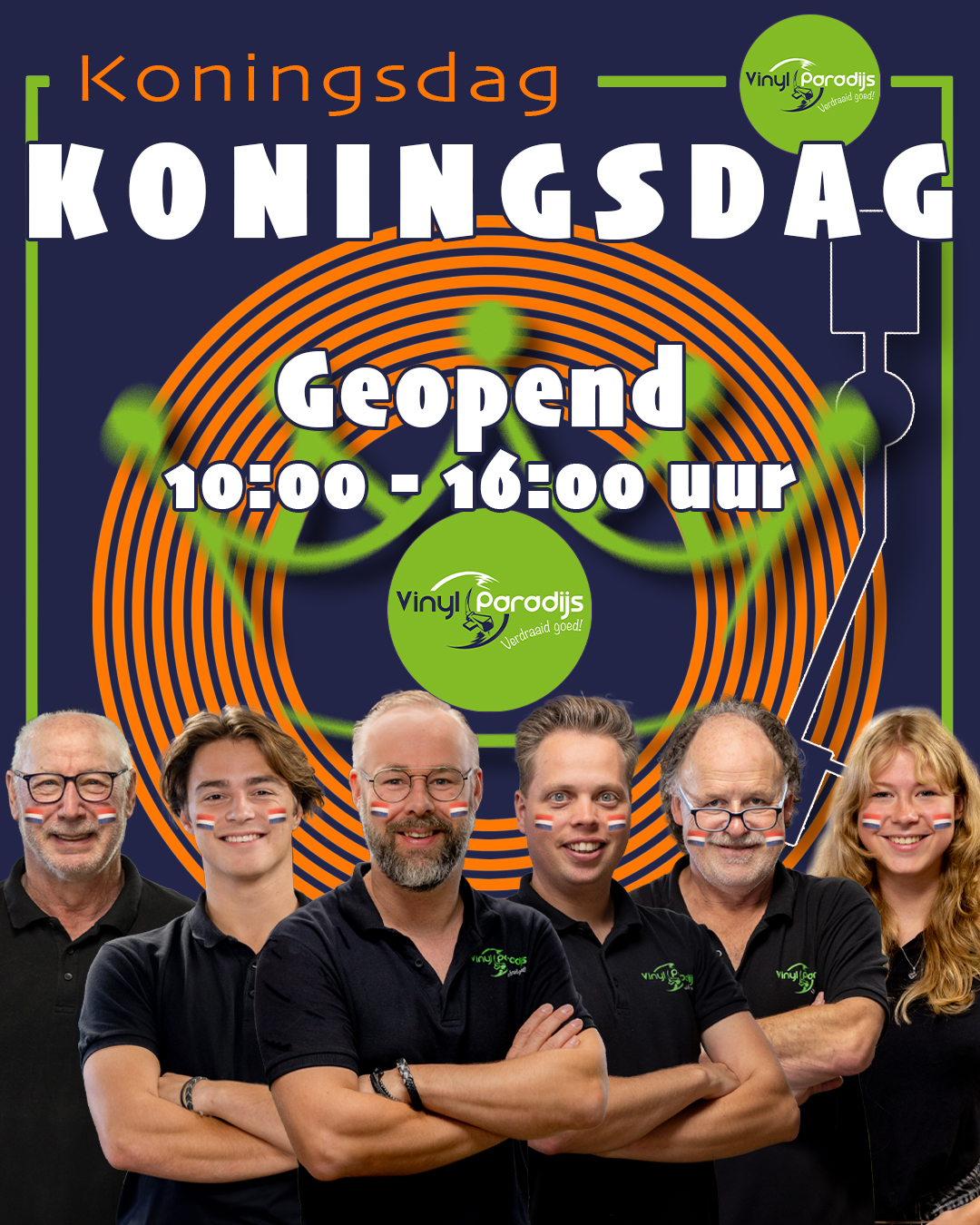Tijdens de kerstmarkt van Geesteren zijn wij op zondag 8 december geopend van 12:00 tot 17:00 uur.
8 december KOOPZONDAG


Tijdens de kerstmarkt van Geesteren zijn wij op zondag 8 december geopend van 12:00 tot 17:00 uur.

Vanaf vrijdag aanstaande (29-11) zijn bij het Vinyl Paradijs de RSD Black Friday releases te vinden!
En niet alleen de exclusieve releases. Ook staan er 20.000 singles voor €2,- per stuk voor je klaar om lekker tussen te snuffelen. En ben je nog op zoek naar een fijne platenspeler of een setjes actieve speakers? Ons team helpt je graag en geeft je een passend advies.
Voor Black Friday staan we vrijdag en zaterdag vanaf 10:00 uur voor je klaar.

Vandaag komt de goedheiligman aan in Nederland. Dat betekend veel zoetigheid maar natuurlijk ook veel cadeaus. Kleine cadeautjes voor in de schoen en serieuze cadeaus tijdens pakjesavond. Voor de muziekliefhebber is er bij het Vinyl Paradijs een ruime keuze aan leuke geschenken! We pakken de cadeautjes graag voor je in.

Het kleine, maar leuke broertje van Record Store Day komt er weer aan!
Op vrijdag 29 november vindt RSD Black Friday plaats. Internationaal een dag van kortingen, bonussen en koopjes, veelal om in te slaan voor de naderende feestdagen. Als fervent muziekverzamelaars beschouwen we Black Friday ook als het ideale moment om een écht bijzonder cadeau te bemachtigen. Voor jezelf of voor een ander.
Vrijdag 29 november kleurt zwart van het vinyl. Een diverse lijst met bijzondere releases. Voor elk wat wils. Bekijk alle exclusieve RSD-titels in het release-overzicht.
Planet Earth is currently experiencing an unprecedented loss of biodiversity, an extinction crisis so severe that many scientists have labeled it the Sixth Mass Extinction. Unlike past events caused by natural catastrophes, this one is driven almost entirely by the activities of a single species: humans. At the heart of this crisis are the world’s endangered animals—species whose populations have dwindled to such low numbers that they are on the verge of disappearing forever. From the snow-covered forests of Siberia to the vibrant coral reefs of the tropics, these creatures represent a silent alarm, signaling a profound imbalance in the health of our planet.
A species is classified as “endangered” when it faces a very high risk of extinction in the wild. The primary authority on this status is the International Union for Conservation of Nature (IUCN), whose Red List of Threatened Species is the world’s most comprehensive inventory of the global conservation status of biological species. The causes driving this decline are multifaceted and interconnected, but they primarily stem from human impact. The single greatest threat is habitat loss. As human populations expand, forests are cleared for agriculture and palm oil plantations, wetlands are drained for urban development, and rivers are dammed for hydroelectric power. This relentless destruction fragments and eliminates the homes, breeding grounds, and food sources that animals need to survive, pushing species like the orangutan and the Sumatran tiger into ever-smaller pockets of wilderness.
Compounding this is the accelerating threat of climate change. Rising global temperatures are melting the Arctic sea ice, which is the essential hunting platform for polar bears. Warmer oceans are causing mass coral bleaching events, destroying the delicate ecosystems that countless marine species, including the hawksbill sea turtle, depend on. Changes in temperature and rainfall patterns also disrupt migration and breeding cycles, creating a mismatch between animals and their traditional food sources.
Furthermore, the direct exploitation of wildlife continues to be a major driver of extinction. The illegal wildlife trade, a multi-billion-dollar global industry, fuels the poaching of elephants for their ivory, rhinoceroses for their horns, and pangolins for their scales. The demand for exotic pets and animal parts pushes species to the brink. The vaquita, a small porpoise found only in the Gulf of California, is the world’s most endangered marine mammal, with fewer than a dozen individuals remaining, driven to extinction as accidental bycatch in illegal fishing nets set for the totoaba fish. Pollution is another silent killer. Plastic waste in the oceans entangles and chokes marine life, while chemical pollutants and pesticides poison food chains on land and in water.
The loss of a single species is not just a tragedy in itself; it can have a devastating ripple effect across an entire ecosystem. Many endangered animals are “keystone species,” meaning their role is so crucial that their disappearance can lead to the collapse of the ecosystem’s structure. For example, the decline of sea otters, hunted for their fur, allowed sea urchin populations to explode, which in turn decimated the kelp forests that provided food and shelter for hundreds of other species. When we lose pollinators like bees and certain bats, we threaten the reproduction of the plants they pollinate, including many of our food crops. Every extinction tears a thread from the intricate web of life, weakening the resilience and stability of the natural systems that provide us with clean air, fresh water, and a stable climate.
Despite the grim reality, hope is not lost. Around the globe, dedicated conservationists, scientists, and local communities are fighting to turn the tide. Conservation efforts take many forms. The establishment of national parks, wildlife reserves, and marine protected areas provides safe havens where animals can live and breed without human interference. For species with critically low numbers, captive breeding programs have become a last resort, successfully reintroducing animals like the California condor and the black-footed ferret back into the wild.
International agreements like the Convention on International Trade in Endangered Species of Wild Fauna and Flora (CITES) aim to regulate and stamp out the illegal wildlife trade. On a local level, community-based conservation initiatives are empowering the people who live alongside wildlife to become its protectors, creating sustainable livelihoods that are linked to the health of the ecosystem. Technology is also playing a new role, with satellite tracking, drones, and DNA analysis being used to monitor populations and combat poaching more effectively.
Ultimately, saving endangered species requires a collective global effort. It demands that governments enact and enforce stronger environmental protections, that corporations adopt sustainable practices, and that individuals make conscious choices to reduce their ecological footprint. The fate of the Amur leopard, the Javan rhino, and thousands of other species rests in our hands. Protecting them is not just about preserving the beauty and wonder of the natural world; it is about safeguarding the health of the planet and recognizing our fundamental responsibility as its stewards.
Deneme Bonusu Veren Bahis Siteleri
Deneme Bonusu Veren Bahis Siteleri
Deneme Bonusu Veren Bahis Siteleri
Deneme Bonusu Veren Bahis Siteleri
Deneme Bonusu Veren Bahis Siteleri
Deneme Bonusu Veren Bahis Siteleri
Deneme Bonusu Veren Bahis Siteleri
Deneme Bonusu Veren Bahis Siteleri
Deneme Bonusu Veren Bahis Siteleri
Deneme Bonusu Veren Bahis Siteleri
Deneme Bonusu Veren Bahis Siteleri
Deneme Bonusu Veren Bahis Siteleri
Deneme Bonusu Veren Bahis Siteleri
Deneme Bonusu Veren Bahis Siteleri
Deneme Bonusu Veren Bahis Siteleri
Deneme Bonusu Veren Bahis Siteleri
Deneme Bonusu Veren Bahis Siteleri
Deneme Bonusu Veren Bahis Siteleri
Deneme Bonusu Veren Bahis Siteleri
Deneme Bonusu Veren Bahis Siteleri
Deneme Bonusu Veren Bahis Siteleri
Deneme Bonusu Veren Bahis Siteleri
Deneme Bonusu Veren Bahis Siteleri
Deneme Bonusu Veren Bahis Siteleri
Deneme Bonusu Veren Bahis Siteleri
Deneme Bonusu Veren Bahis Siteleri
Deneme Bonusu Veren Bahis Siteleri
Deneme Bonusu Veren Bahis Siteleri
Deneme Bonusu Veren Bahis Siteleri
Deneme Bonusu Veren Bahis Siteleri
Deneme Bonusu Veren Bahis Siteleri
Deneme Bonusu Veren Bahis Siteleri
Deneme Bonusu Veren Bahis Siteleri
Deneme Bonusu Veren Bahis Siteleri
Deneme Bonusu Veren Bahis Siteleri
Deneme Bonusu Veren Bahis Siteleri
Deneme Bonusu Veren Bahis Siteleri
Deneme Bonusu Veren Bahis Siteleri
Deneme Bonusu Veren Bahis Siteleri
Deneme Bonusu Veren Bahis Siteleri
Deneme Bonusu Veren Bahis Siteleri
Deneme Bonusu Veren Bahis Siteleri
Deneme Bonusu Veren Bahis Siteleri

Ook tijdens de zomervakantie zijn wij geopend volgens de reguliere openingstijden.
wo 10:00-18:00 uur – do 10:00-20:00 uur – vr 10:00-18:00 uur – za 10:00-17:00 uur

Op zoek naar het perfecte cadeau voor Vaderdag? Kom langs bij het vinylparadijs en het kleine paradijs en verras je vader met de mooiste muziek op vinyl! Of hij nu houdt van klassieke rock, jazz, soul, of de nieuwste hits, bij ons vind je een uitgebreide collectie die zeker in de smaak zal vallen. Ook voor alle muziek gerelateerde cadeaus kun je bij ons terecht. Van schoonmaak-sets tot t-shirts. Verder bieden wij:

2e Pinksterdag staan we voor jullie klaar vanaf 12:00 uur.

Morgen gaan wij een dagje genieten van de festiviteiten tijdens Hemelvaartsdag. Vrijdag en zaterdag zijn er wij uiteraard geopend met een bomvolle winkel😃😃😃 Geniet allemaal morgen van een mooie Hemelvaartsdag

Koningsdag zijn wij geopend van 10:00 tot 16:00 uur